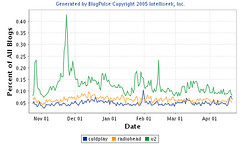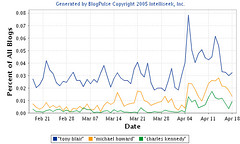u2 rides out the buzz of new pretenders

u2 rides out the buzz of new pretenders
Originally uploaded by cape.
blogpulse is such a powerful tool to analysis buzz - try war vs peace
exploring global network services to local markets


this is an incredible trend analysis service, type in anything and plot the buzz
see edited version at Media Guardian, April 11th, 2005
After the irrational exuberance of the bubble economy when they fondly hoped that the Internet would go away, major media companies and more importantly the advertisers who sustain them are no longer ignoring the cold, hard fact of hundreds of millions of people online and billions of dollars of economic activity. They are finally becoming meaningfully engaged.
For nearly a decade Internet businesses have extolled online media’s unparalleled levels of accountability and interactivity but for all this, what mainstream advertisers really wanted more than anything else is reach and frequency. Well the future might finally have arrived, in the
This is a remarkable figure – and remarkably scary for most traditional media owners because when an advertiser can buy both scale and accountability it starts to have a direct impact on the amount of revenue that they will direct to any particular channel. In fact for the first time, online advertising has now overtaken radio in terms of total spend and the IAB showed in November 2004 that paid search alone in the UK is now 50% larger than cinema advertising.
Yahoo!, Google and MSN are increasingly biting major chunks out of the traditional advertising budgets and along with eBay and Amazon making serious in-roads into local and classified revenues. It’s no wonder that the New York Times and Dow Jones are starting to acquire some sizeable online assets to boost their attractiveness to advertisers and Rupert Murdoch has sounded the rallying cry at News Corp to start taking the Internet seriously again.
But unlike episode one when News Corp, Time Warner, Viacom, NBC Universal and Disney had the advantage of scale and the prospect of an open market at its very earliest stage, populated by relatively small and undercapitalized businesses, in episode two it will truly be a clash of the titans. In fact in the sequel the odds will be stacked in favor of the businesses who have been born online and who have been feeding further up the value-chain than the sprawling empires of these news and entertainment businesses.
The Internet is now part of our social fabric. Every day nearly a quarter of the
In the
The spectacular success of services like iTunes, Sky+ and online DVD rental services, all point to an increasingly sophisticated and liberated consumer who wants media and entertainment to be made available so they can make the choice rather than having it pushed at them. Now that so much information and entertainment is available through the Internet, we have come to expect the same level of control, flexibility and most of all choice in all our media and retail experiences. In fact through BitTorrent and other online services you can easily download a pirated copy of any major network TV show, or thousands of others for that matter, within hours of broadcast and burn them to a DVD.
If Malcolm Gladwell’s “tipping point” was the buzz word in the marketing world for the last few years, it is fast being replaced by Chris Anderson’s “long-tail” of almost infinite shelf-space, which digital distribution offer that breaks the distribution bottlenecks of broadcast and bricks-and-mortar. This of course put businesses like Google, Yahoo! and Amazon who are network and device independent and are able to offer people a fun, easy and efficient way to navigate huge catalogues of content – digital or otherwise – in an extremely powerful position.
No wonder both Yahoo! and Google, who hold two of the largest front doors onto the Internet have begun to experiment with video searches. In Yahoo!’s case you can scour any video file available on the web and in Google’s you can scan all the close-captioning from the latest TV shows to find just the clip that you want to watch. Now put yourself in the shoes of a TV business that relies on either advertising or subscriptions to monetize people’s viewing habits and map that against broadband adoption, the amount of time people are starting to spend online and the “long-tail” – where do you get to? Google TV? Maybe, they certainly have an advertising model to support it.
